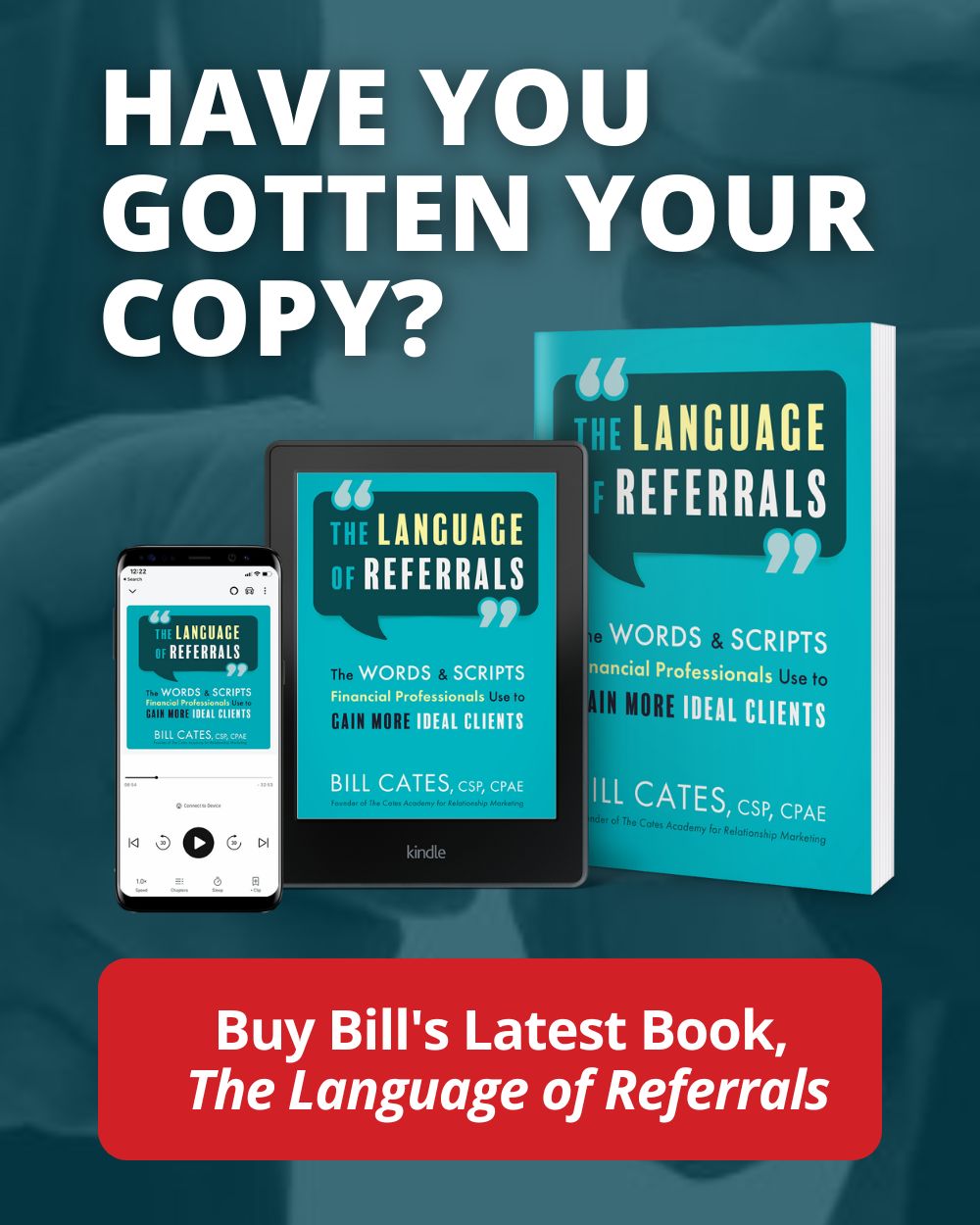Check Out Bill Cates’ NEW Top Advisor Podcast™
Interviews with Top Advisors for Top Advisors!
Top Advisor Podcast™
Ep. #7 – Build a Successful Business Operating By Referral Only with Diana DeFrate CFP®, CLU® and Katriina Paavola CFP®
Advisors often ask, “Is it possible to build my business that runs by referral only?”
The answer is, yes!
However, not every advisory team has been able to create a “by referral only” business where the quantity and the quality of clients have been exactly the right fit.
Are you getting enough in-segment clients through referrals and introductions?
In this episode, Bill Cates speaks with Diana DeFrate CFP®, CLU®, chief executive officer and founder, and Katriina Paavola, CFP®, founder at DeFrate & Paavola, LLC. Diana and Katriina share how their successful business operates by referral only, sharing how they do so WITHOUT asking for referrals.
Want More Top Advisor Podcast Episodes? CLICK HERE!
–
Diana and Katriina discuss:
- How the changes in their target market have affected their business and caused them to make the decision to become “by referral only.”
- The marketing strategies they tried that didn’t work, but led them to what does work.
- Why you should have a ‘wow master’ on your business team to build client relationships
- How they get referrals WITHOUT asking.
Connect With Bill Cates:
- BillCates@referralcoach.com
- (301) 497-2200
- Referral Coach Homepage
- Hire Bill for Coaching
- Enroll in The Cates Academy™
-
Show Transcript
BILL: Welcome to the Top Advisor Podcast brought to you by ProudMouth’s Influence Accelerator Academy. I’m your host Bill Cates. In each episode, I interview one of the financial service industries top performers to learn their secrets, to sustain success. These short interviews will get right to the heart of what each top advisor is doing to acquire more right fit clients.
You’ll be reminded, renewed and inspired to take powerful action. You’ll impact more lives and increase your income at the same time. Now, onto the show.
So Bill, is it really possible to create a business, 100% based on referrals? Over the course of almost 30 years of teaching financial advisors, even the very top of the top had to create more referrals that turn into introductions and become new clients.
I can’t tell you how many times I’ve been asked that question. My answer is always a resounding “Yes.” But not every advisory team has been able to create a hundred percent referral based business where the quantity and the quality has been exactly what they want. What about you?
Are you getting enough in-segment clients through referrals and introductions? Well you’re in for a treat, with me today are Diana DeFrate and Katriina Paavola. Diana and Katrina work as a team and have been referral only for at least five years, if not longer. I think you’ll find their story and their business model both interesting and useful to your own business.
So Katriina and Diana, welcome to Top Advisor Podcast.
DIANA/KATRIINA: Thank you.
BILL: It’s great to have you. I’ve been really looking forward to this interview for a long time, because I like to get the ideas that our listeners can think about implementing into their own practices. I don’t always ask my guests how they get started in this business, however, in your case, I want to make an exception.
Not only do I find it interesting how you got started, but I think germane to what we plan to discuss.
DIANA/KATRIINA: Sure. I’ll take that question. Katriina and I knew each other in our previous careers, we both worked for a media company, Time-Warner, and we knew we worked well together. We had very complimentary skill sets.
And we got to a point where we decided we wanted to do something different. I had actually grown up in this business. I had family members that were in the independent advising world. And so that was an option for us. You know, when we started talking about it, what do we want to do next? We really wanted to be able to connect with people on an individual level and be able to make a difference in people’s lives.
So we started our practice in 2000. And, you know, essentially we grew it just word of mouth.
BILL: So before we get to the topic at hand, give us a quick overview of your business. How long you’ve been in business, where you’re located, things like that.
DIANA/KATRIINA: Sure. We started the firm about 20 years ago. Our offices are located in Midtown, Manhattan.
As I mentioned, we both worked for Time Warner. So the Midtown location was perfect for many of our early clients. We knew that we had a natural market with all of our connections. I had worked at Time Warner for 15 years. We also have five staff members currently. We embraced the remote model before it was kind of even popular. Former staff and current staff have always worked remotely.
We have people in Pennsylvania, Delaware, and New York and New Jersey now. Our specialty, which has kind of just happened naturally is about 67%, two thirds of our business are women. And almost all of our clients have some connection to the media world. Specifically, most of our clients came from the magazine publishing world.
BILL: I’m curious when you talk about the magazine publishing world, so that could be considered a target market, a niche, that’s probably been pretty disrupted over the last number of years with the internet, a lot of these folks have gone to online and stop printing.
I’m curious how the changes in that target market of folks involved in magazine publishing has affected your business. How was what’s going on in your target market made it better, worse, the same for your business?
DIANA/KATRIINA: I’ll take this one. So it could, because this is actually very much related to why we became referral only.
We as part of our marketing, we used to do workshops at the Time-Warner company. So this is TIME Inc, Time Warner, HBO. Diana and I both worked there so we knew the benefits, but we also studied the benefits. We knew them inside out. Right. So of course we knew a lot of people in those companies.
So we did workshops. The companies were very focused on what they called lunch and learn sessions. So we were not the only people doing sessions, workshops. But we got in front of a lot of people there, a lot of employees and we made a lot of clients through that. But then of course we saw what was going to happen with the media industry and that sort of leads to our referral discussions.
We figured that either we’re going to have to come up with some new companies where we can sort of replicate what we have been doing with Time-Warner or we try something different.
BILL: And what did you decide?
DIANA/KATRIINA: The idea of trying to replicate it somewhere else is great, but it’s not easy to do. It wasn’t natural. You know, we both worked at Time Warner so it was a natural fit. Actually one of the other things, I’ll go back to this. You’re going to figure how to sort of tie this in later. But one of the things that we tried early on this is when we just started in this business, we were coached that the only way to make it in a business is by doing direct marketing seminars.
Right? So we tried this, we did two dinner seminars in a Midtown Manhattan hotel. We invested a lot of money into that and we did not get one prospect out of it. So initially we viewed it as a major failure. But honestly, afterwards, pretty soon afterwards, we realized that it was a real gift to us.
It’s great that we did it. It was not natural for us. It did not work. So we got so much learning from the experience. And we realized that we have to focus on the natural market for us, the people that we know, the people who know us.
BILL: Right. It’s a path of least resistance for you and for them. And I think that’s the beauty of this business, where someone is having great success doing the seminars, whether there’s dinner involved or not, right. And others don’t, it’s got to fit you, it’s got to fit your market.
And so by realizing that isn’t your way or it wasn’t going to be your way moving forward. It sounds like you decided natural market, which is also the referral. So this idea of building a referral only business where you’re not really having to do any kind of seminars or any kind of major marketing endeavors.
You really just multiplying your best clients? Or was it an intentional decision? You say, all right, we’re going to start this referral stuff. We’re going to make sure we multiply our best clients. Or did it just sort of happen or some combination of that?
DIANA/KATRIINA: It is a combination of different things, but one of the things that we had also tried was we started a new company with a third partner who was solely focused on finding referrals and reaching a different audience that also wasn’t natural for us.
Needless to say that did not also work. So we had to rebrand again and it was in 2013 when we rebranded back to DeFrate and Paavola and we were reprinting business cards. And that’s when Diane and I decided that were going to put in the business cards, referral only. And interestingly, yes, sorry. It did seem like a small thing initially, but it was a very big thing because it was ink on paper for our clients, but perhaps more importantly for Diana and myself that we are now referral only.
BILL: Yeah, that’s stating the commitment. And I suppose if somehow you acquired a good right fit in-segment client and not through referral, you’d probably serve them, but you’re putting your stake in the sand and making that message. And I’ve had a lot of folks over the years I’ve coached and worked with, who have done that.
Tell me, did clients react or when you give a card to someone and they see that, do they comment. What happened based on that commitment to be referral only?
DIANA/KATRIINA: I’ll try to answer this one. It also became how we started asking for referrals, because when you tell your clients, by the way, we made the decision to focus on you and the people you know, and that’s it. We’re not going out there that the firm that we tried to start, we really tried to grow and make ourselves, you know, almost a national firm. That’s why we had brought in this other business partner. And the reaction from our clients was, “Thank goodness you’re not going to do that.”
They were so happy to have us back. And then this was the perfect time to then do this transition to referral only and say, as a result, in our commitment to you. We are not going to try and expand beyond what we’ve already built. At the time we had about 150 clients. And we said, look, if we just focus on them, all we need are, you know 20 good referrals a year, 20 to 30 good referrals.
So let’s just work that, and that gave us that, that’s actually how we do ask for referrals. We remind everybody we’re referral only. So who in your world, can we help? What can we do for you, our client base? Because you are the most important people to us.
BILL: As you bring on new clients, those people are coming in through referrals.
And I like to use the term introductions. They’re predisposed, are they not? I’m assuming that. You celebrate the fact that George referred Laura to you and because this is how you meet people. People are more comfortable. So it sounds like you’ve been pretty direct with your clients, letting them know that this is how we grow, which is a little bit focused to you. Right? How you grow? Have you been able to turn it around a little bit, in other words, what’s in it for them that you are working by referral only?
DIANA/KATRIINA: Yeah. It frees up our time. We can spend more time with our clients. Also we’ve continued to invest in the business and expand our staff.
So that’s something, another way we are positioning to our clients. Our goal is to basically free up all of our time, so we can spend time with you and spend time on your plans and your goals and your dreams, and be able to support you and your entire family. You know, we’re getting into a lot of second generation clients now and things like that.
So, yeah, so really the focus is. We’re keeping it very narrow. We’re going to serve you. We’re not going to try and get too big. We’re not going to have crazy growth goals. But when in fact it’s happened naturally, you know since we went referral only, we actually went back and looked at this.
We had 150 clients about seven years ago. We now have 300 households and our AUM has tripled in that time. So our clients have doubled and the AUM has tripled. We know it’s working.
BILL: Yeah. I’d say that’s working. So you don’t really have a target market per se anymore, other than your clients, I guess, are your target market.
And you’re just multiplying the best. This is wonderful focus. This is what I’ve been trying to teach and help people do for the last 27 years. Was there any hesitancy or angst around this referral only. Did you doubt whether it would work at any point or did you just go in knowing it would work?
DIANA/KATRIINA: I would say we knew we had a good thing going. We knew we really liked our clients. There was a natural market with the media world. We kinda knew if we just focused on them and we had to make the two big mistakes, as you know, Katrina said right off the bat, trying direct marketing seminars.
Nope. Didn’t work for us. And then, you know, trying another company with somebody else to bring in more people. Nope, did not work. So I think after making those two mistakes, we kind of knew, we felt very confident that this was the way to go.
BILL: Interesting. Right?
DIANA/KATRIINA: Yes. And something I would add to that too, is that kind of goes to your previous question as well.
You know, what is in it for the client? That we are referral only, is that we’re very focused on community as well. So when it’s not pandemic times we do client events for our client base. And, we have an evening open doors. We serve some beverages and we have caterers and a lot of our clients come to, and a lot of them, even refer to it as a TIME Inc. kind of get together.
Right. And they meet people they used to work with 20 years ago and they love it. And just the idea that they know it is our community. We serve the same people.
BILL: I want to emphasize that for everybody listening, many of the folks that I’ve interviewed over the years and coached from time to time met after speaking events, they bring up that idea of a community, a feeling of a community.
I have one advisor who will be part of this podcast, I’ve interviewed him. I’m not sure when you’ll make it on, but he was talking to his clients and checking in with them to make sure they were happy, what we call a value discussion. And they said, Rod, we feel like we’re part of a club. We feel like we’re part of a country club with you. Cause he does a lot of events too. And so I asked her, I said, so did you tell her that the club needed more, members? But that whole idea of community I think really makes a difference. So, you told when we were getting ready for this interview, that one of your team members is known as the “Wow Master”.
Tell us more about that interesting position, how it came about, how it benefits you and your clients?
DIANA/KATRIINA: Sure. This is something when we became referral only, we really did start focusing on the client experience at that point as well. But we had never really hired for that. We’ve always talked about Wows and the reason we’re so focused on Wows is when clients have that type of experience, it’s a story that they can tell, which of course is the best for referrals.
It’s the easiest way for them to be able to talk about us. So we’ve always had it be a priority. But for some reason over the years, we just never assigned it to somebody. And when we hired our current, one of our current team members about two years ago, when she came on board she interacted with the clients a lot.
And so we noticed that she was really getting to know them even more. And she was really good at finding things that are very unique with each client. When we have milestone events, you know, birthdays, anniversaries, kids graduating college, whatever it is, she was able to come up with some really good ideas for little things that we could do for them. And so we realized, at the end of 2019, beginning of 2020, this was her unique ability and the relationships and the enhancement to the relationships that she was providing to our clients. I mean, Katrina and I get emails almost daily of clients thanking us for the thoughtful card, for the thoughtful gift, whatever it is.
We realized, wow, we need to make this part of her job. So it has evolved. We did a reorganization at the end of last year and we made this part of her responsibilities and really about half of her responsibilities. And so as a full-time keeping track of this and trying to make a process out of it, That’s great though.
BILL: The Wow Master. I know one firm who has a CEO, but it stands for Chief Experience Officer and it’s all about, you know, that experience. And let me ask you this question. I know you, maybe you weren’t prepared for this, but I’m curious, you know, many advisors they kind of keep an arm’s length with their clients, right?
They just want it to be that professional relationship. And of course we want it to be professional, but they don’t get into these items that you’re doing that kind of build the business friendship, if you will. I mean, could you imagine running a practice where you didn’t do these sorts of things? Where you didn’t create this experience? Where it was just real straight and business like and no conversation around what’s going on in the personal lives of your clients?
I just love to hear you react to that.
DIANA/KATRIINA: Yeah, I’ll answer that. So the answer is no, we could not even think of how a business like that in this business would work. And on the wow specifically, Yes, we have a person who is in charge of this, but the entire team, I mean we talk about this, we do something called a stand up every morning at nine o’clock with a whole team.
And you know, if there is a Wow, we talk about wows and even in our meetings because when we do our client meetings nowadays, Diane and I have a team member, a VP in the meetings together with us. They take the notes, we focus and they focus on Wows all the time. So our meeting notes, even they have a lot of details.
BILL: But they’re listening for that possible Wow. Something that’s great.
So in a minute, I want to talk to you about how you handle the inevitable prospects that come your way that don’t fit your business model. But first let’s hear a quick word from our great sponsor.
SPONSOR MESSAGE: This podcast is brought to you by ProudMouth, the influence accelerator. We help you sell less and advise more by turning you into a recognized subject matter. Visit us ProudMouth.com to learn more about our influence accelerator services.
BILL: With me today, they are Diana DeFrate and Katriina Paavola talking about how they have built a successful business operating solely on referrals.
So emphasis on successful, right? It’s one thing for people to say, I work referral only, but they don’t get very many referrals. So here’s a question and I know some of your listeners must be thinking, some advisors won’t take on clients that don’t fit their model. Others will take them on, but only because they can’t say no, or don’t want to offend the referral source.
I believe you have a different perspective on this. Could you talk to us a little bit about how you handle the referred prospects who may not be perfect, right fit clients?
DIANA/KATRIINA: Sure. I’ll handle this one. Yeah. You know, we feel that everybody, should have access to good financial advice, especially if they come through an existing client.
So if they’re not ideal and it does happen occasionally, we kind of view it as our pro bono work, you know, we will take care of them. We will make sure that they have a plan. Also part of our reorganization and adding more team members was also so that we would have more staff to help with situations like this.
So maybe our time doesn’t have to be as capitalized with some of our more top clients, but that we still give them access to our process and how we do business. And we’ve never had minimums either throughout all these years. When we started this practice, we never set minimums because again, we just really do feel that people need access to good advice.
And if they’re the right fit and they have a great attitude and they’re willing to work with us, then, you know, we’ll help them.
BILL: Good. And I know not everyone does it that way. There’s all kinds of ways to do this.
I think the key here is that it’s intentional on your part, right? It’s not that you don’t know how to qualify these folks and quote, unquote, turn them down or move them over to someone else.
It’s that you’ve chosen to do it this way, as opposed to by default, which I found a lot of people, they’re not happy with it. So, what about actually asking for referrals or introductions? I know you’ve informed everybody that this is the way you operate. It’s what’s in it for them a little bit.
But do you ask you ask for referrals in a particular way and any kind of method or is it really just more of the promoting of the process and that generates enough?
DIANA/KATRIINA: That’s exactly it. We do not ask for referrals. We do not put down a piece of paper in front of the client and say, write down five names.
What we do is just have those gentle reminders to our clients that we are referral only. And this is what we have chosen. This is what we have done in the past 10 years, or however many years it has been.
BILL: So when people come to me and say, you know, is it possible to build a referral only business and be successful?
The answer is yes. Is it possible to do without asking for introductions? And the answer is yes. And I think the answer is also having the Wow Master or having the attitude that you guys bring. You guys have built a culture, right? It’s a culture of caring. It’s a culture of, wow, it’s a culture of great experience.
It’s a culture of people knowing that you are operating through referrals, introductions, what’s in it for them. It’s the whole thing put together. Right. I think that’s what makes the biggest difference. And you can do it without asking. I mean, I’m a proponent of asking. I teach people how to do it without being aggressive, et cetera.
And the good news is you don’t have to ask, you do other things really, really well. I have one more question to ask both of you, but first, you know, knowing that I’ve spoken at many conferences, coached, interviewed hundreds of successful advisors like yourself, their teams for almost three decades, a long time.
I was wondering, do you have any questions for me?
DIANA/KATRIINA: Sure. Since you do have all this knowledge of working with successful practices over decades, what do you see? What types of common characteristics, what type of cultures? There’s gotta be some consistencies between all the top practices. And is there anything that you can share with us?
BILL: Yes. And I think you’re doing it, and it’ll be good reinforcement for you and for everyone listening. So every now and then I talk to an advisor, a team of advisors where they really are marketing machines. And they’re constantly bringing in more advisors, they’re acquiring other firms.
They’ve got a huge marketing arm. They’re spending a lot of time marketing and, you know, they’ll have 3000 clients. Personally, I don’t know how one can have 3000 clients. I think one could have served 3000 people in some form, but to actually have clients I’m a little suspicious with that.
But most of the people that really are managing a lot of money or just doing a lot of production and whatever it may look like they’re doing what you’re doing. And that is that they’re providing value and they’re building the business friendships. So our research has demonstrated that there’s actually a low correlation between satisfied clients who are usually loyal clients and the giving of referrals. We need something more than just satisfied. We need engaged and they need to be engaged with our value. So they love the questions we ask, the things we teach, the response of service, you know, educational opportunities, all of those things.
But they also appreciate the personal connection with us and with other people on the team that interact. I think it’s that business friendship that we can build with many clients. That’s the secret sauce to starting to create advocates, to have people who want to pay it forward, want to help others.
Because they believe in your value, but they also want to help you. And that’s kind of that magical combination where they want to help others and they want to help you at the same time. And those are the folks who usually insist that their friends or relatives talk to you. They’re very tied into making a good connection and making sure it goes through.
And, sometimes your ego gets involved and making sure the connection goes through. So I’d say. If there’s any common denominator, it really is paying attention to that engagement and that client experience, doing a lot of events is another way to do that, which you will, and others will get back to.
So I have to say that’s a common denominator. The other I would say is, and this is true really for everyone in any walk of life. And that is courage, right? The courage to try out new ideas, the courage to put your stake in the ground to go after a niche, the courage to decide to put referral only on your business card and announce it to the world and to yourselves that that’s the way you’re going to operate.
And you knew it was the right way to go, but I’m still sure it took a little courage to get started in that direction. And sometimes we have to figure out what we don’t want before we figure out what we do want And that happened to you guys a couple of times. And that’s good. You didn’t burn too much money learning the lesson, hopefully.
That’s just my perspective. So thank you for asking. My last question is for both of you. I’d like you to think back over the last 12 months or so, what have you learned about yourself? What have you learned about the business, the industry, how have Katrina and Diana grown over the last year?
DIANA/KATRIINA: Okay, I’ll start. I would say my growth in the past year has been in delegating. Our goal, Diana and myself, is to do what only we can do. And delegate everything else. So we reorganized in the last quarter of last year, 2020, and we now have the title of VPs. We have staff members who are sitting in our meetings together.
And they take notes. They do all the up. Essentially, we delegate everything if we can delegate. And of course requires a team that works really well together. So staffing is a focus that probably will never go away.
It’s funny. We both jotted down an answer to this question separately, and we did compare notes before we got on here.
I said exactly the same thing. I may have said it a little differently, but I said, you know, the thing in the past year for me is that it is all about staffing and I want to continue to invest in the business so that I can spend more time with our clients, building those business friendships.
And also so that I can have my own time personally, and I feel better balanced. So really staffing, staffing, staffing is the biggest key and what I’ve really embraced. You know, we eventually have long-term goals. At some point we probably will stop. We will hit a capacity where we can’t take on new clients and we’re fine with that, but I want to kind of get there as quickly as possible. I think we have a ways to go because we can still add staff and just keep delegating.
BILL: So our guest today on Top Advisor Podcast have been Diana de freight and Katrina Paavola, they’ve built a referral only business and they don’t ask for referrals. That’s a wonderful thing. This is a Bill Cates reminding you that ideas do not make you more successful. Only acting on those ideas will bring you the success you desire.
This is Bill Cates, and you’ve been listening to the Top Advisor Podcast sponsored by ProudMouth, be sure to click the subscribe button so you don’t miss the latest show and feel free to share this and other episodes with your colleagues. And if you want to learn more about the work I do with other top advisors, just go to ReferralCoach.com
About Our Guests
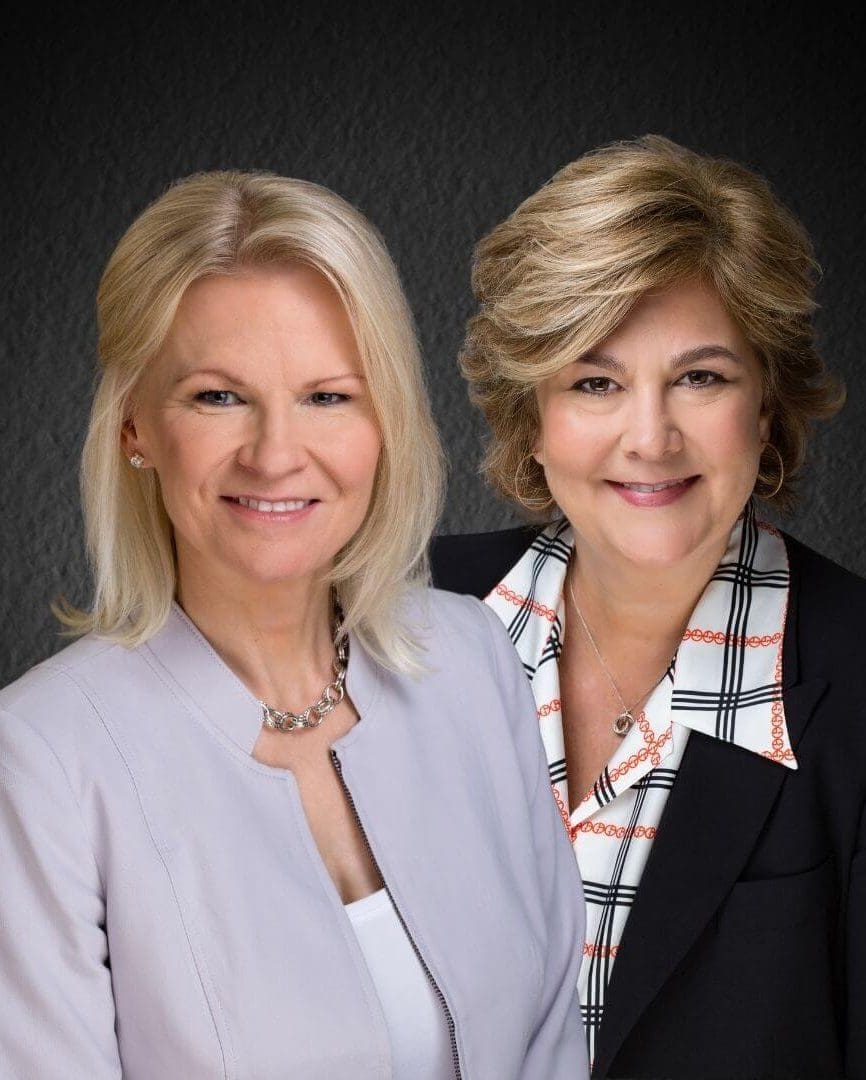
A former financial executive in media, Diana DeFrate is a Certified Financial Planner certificate (CFP®), Chartered Life Underwriter (CLU®), CPA, and the second in a family legacy of wealth managers and financial planners. An avid wine enthusiast, Diana is a WSET Advanced Certificate holder, director and co-founder of the Geshtin wine club.
A Certified Financial Planner (CFP®), MBA, and former media professional, Katriina Paavola is a strategic director and financial consultant with specialties in retirement planning and investment management. A native of Finland, Katriina studied international business in London before coming to the U.S. as an executive strategic planner.
Connect With Diana DeFrate and Katriina Paavola:
- (212) 707-8754
- Defrate and Paavola
- LinkedIn: Diana DeFrate
- LinkedIn: Katriina Paavola
![]()
Never Miss an Episode!
Click below to subscribe on your favorite podcasting platform.
P.S. Don’t keep Top Advisor Podcast a secret … share with a friend or colleague!
Click Here to Subscribe Tell a Friend
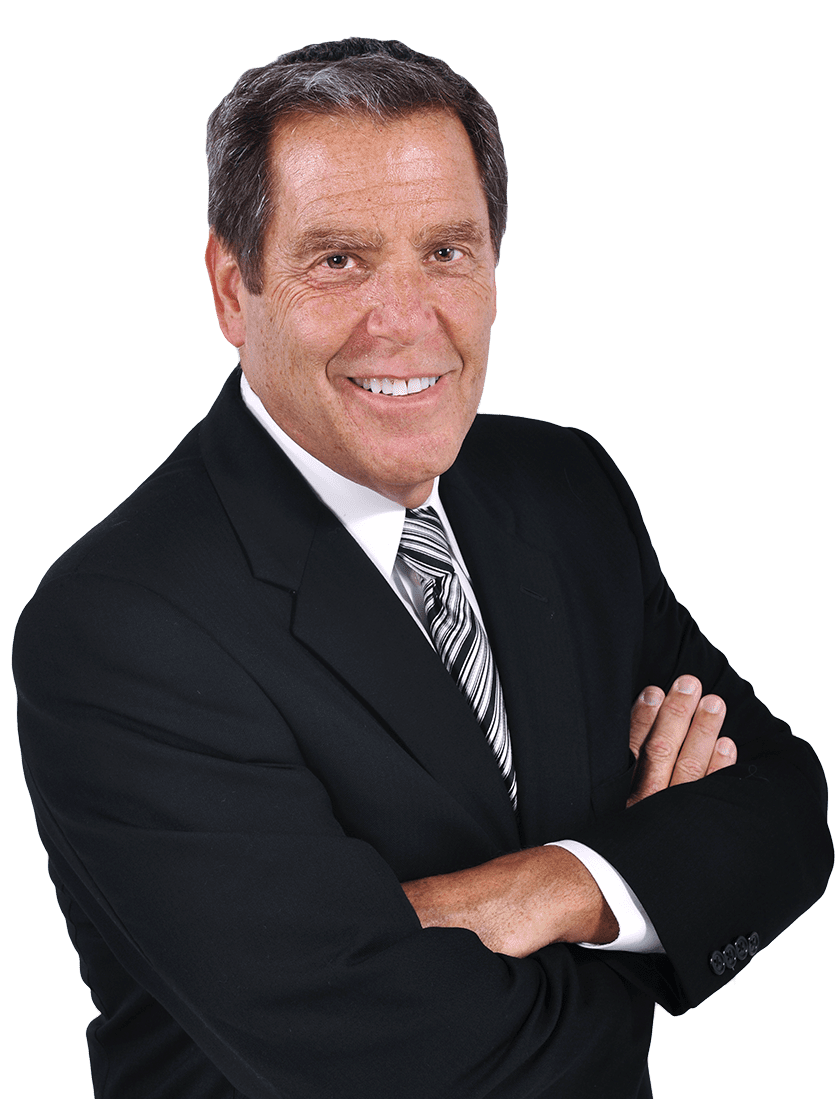
About Your Host
Bill Cates, CSP, CPAE, works with established financial advisors to speed up their growth without increasing their marketing budget. Advisors tap into Bill’s proven process to multiply their best clients through introductions from advocates and Centers of Influence (such as CPAs and attorneys), communicate their value proposition more effectively, and create a reputation in a profitable target market. Bill helps advisors move from push prospecting to magnetic marketing – to attract more Right Fit Clients™.
Bill is the author of four best-selling books, Get More Referrals Now, Don’t Keep Me a Secret, Beyond Referrals, and Radical Relevance. Bill is a highly sought-after international speaker and coach, as well as the founder of The Cates Academy for Relationship Marketing™.
Do you know someone Bill should interview (including yourself)?
Do you have a topic you’d like to see covered?
Contact Bill Cates directly: BillCates@ReferralCoach.com


